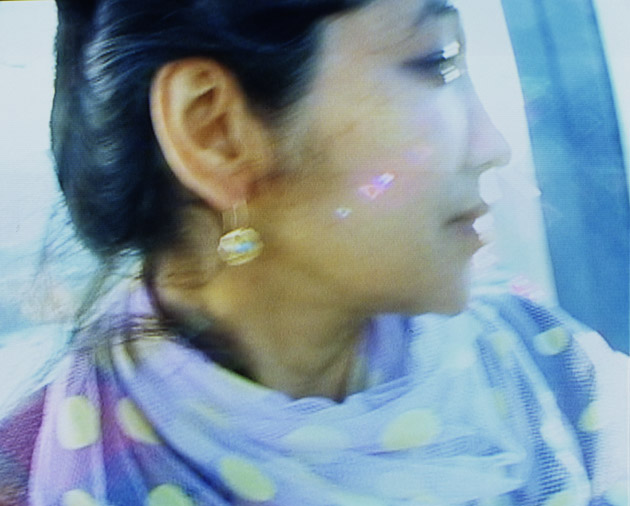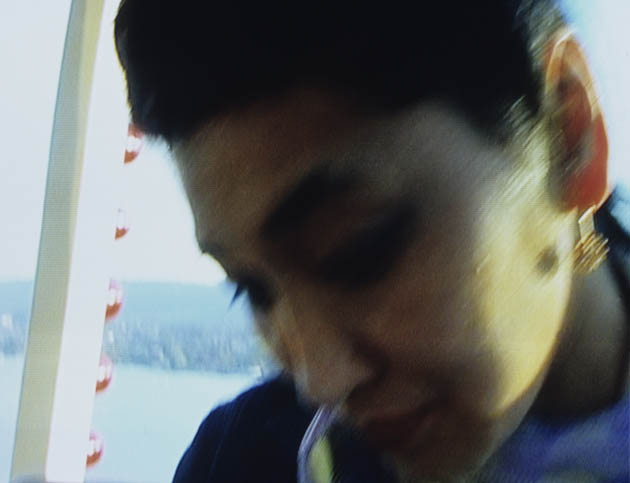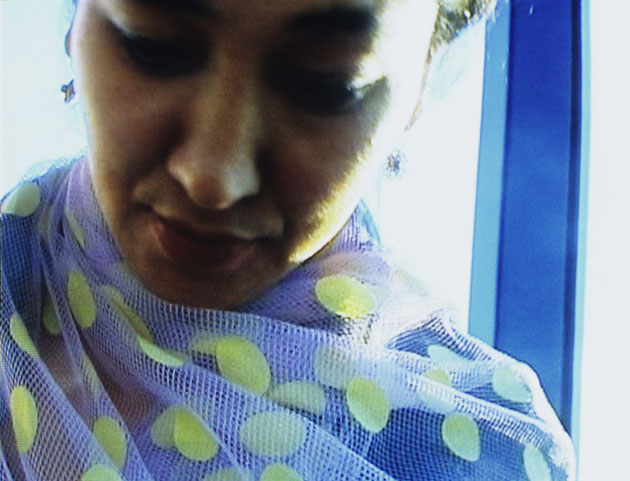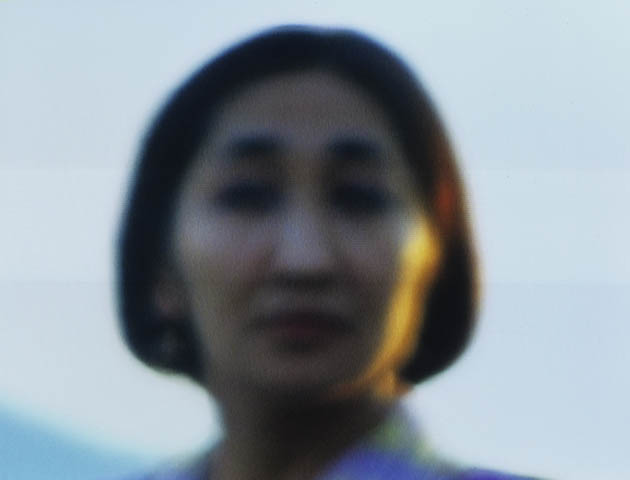SAADET TÜRKÖZ
URUMCHI

Saadet Türköz:Voice
Karsiga Ahmediyar Dombra on 2, 3, 6, 10
Sayan Akmolda Kilkobuz, Dombra on 1, 5, 7, 8, 13
Talgat Mushik Sazsirnay, Shankobuz, Sibizgi on 5, 8
Selim Kerey Sidiyik Dombra on 9, 11, 12
Mamer Rayeskhan Dombra on 14
Almagül Davletkalieva K¦lkbobuz on 4
Eldar Saparayeva Cello on 4b
Compositions by Saadet Türköz / Traditionals, except 5 by Sayan
Akmolda and 10 by Karsiga Ahmediyar
Recorded 04/05 Almaty, Kasakhstan
and Beijing, China
Mixed and Mastered by Martin Pearson 2005
Liner Notes: Ilma Rakusa ·
Cover Art & Photos: Videostills by Pipilotti Rist ·
Graphic Design: Jonas Schoder
Intakt CD 109
Es gibt Fügungen. Als ich mit zwanzig, zu tiefsten Sowjetzeiten, nach Usbekistan und Kasachstan reiste und mit vielen Schallplatten einheimischer Volksmusik zurückkehrte, konnte ich noch nicht ahnen, dass ich eines Tages in Zürich einer Sängerin Turkestans begegnen würde. Nach Mittelasien trieb mich Fernweh: nach Steppen und Wüsten, nach Städten und Routen jener sagenumwobenen Seidenstrasse, die meine Phantasie seit je beschäftigt hat. Was für Namen: Buchara, Samarkand, Chiwa, Alma Ata. Was für ein Völkergemisch: Usbeken, Kasachen, Kirgisen, Turkmenen, Uiguren. Als wäre ganz Mittelasien eine riesige Karawanserei, eingerahmt von den schneebdeckten Gebirgszügen des Altai, Pamir und Tienschan.
Ich erinnere mich an die sengende Hitze in Taschkent, an schattige Teehäuser,
an bunte Märkte, an die riesigen Apfelplantagen rund um die kasachische
Hauptstadt Alma Ata, an vielfältige Gesichter unter vielfältigen
Kopfbedeckungen, an Musik, die mein Ohr in Bann schlug. Ihre wehmütige
Monotonie eröffnete Sehnsuchtsräume.
Und plötzlich, Jahrzehnte später, die Stimme von Saadet Türköz.
Auch Stimmen können treffen, mitten ins Innerste, und so berühren,
dass Welten aufgehen. Ja, da ist es wieder, das kasachische Wiegenlied, das
Liebeslied, das Klagelied. Da ist es, aber neu, aber anders. Saadet singt
satt und zart, mädchenhaft-neckisch und fraulich-warm, mit weitem Atem
und einem Timbre, das alle Stimmungslagen umfasst. Heiterkeit kippt in Trauer,
ja manchmal ins Bodenlose, die Stimme - eben noch voll und tragend - sackt
weg, und aus den zuversichtlichen, langgezogen-vibrierenden Terzen wird ein
absteigend-abgründiges Glissando.
Man fragt sich, wie Saadet Türköz aus der fast kindlichen Schlichtheit
mancher Melodien so viel Reichtum zaubert. Die Antwort kann nur sein: weil
sie ihrer Stimme vertraut. Und den vielen Stimmen vor ihr. Bewusst reiht sie
sich in die Tradition kasachischer Volksmusik ein. Aus diesem Fundus schöpft
sie - durchaus nicht paradox - auch ihr improvisatorisches Talent. Und niemand
wird ihr unterstellen wollen, sie kokettiere mit Ethno-Sounds. Herkunft ist
für sie Verpflichtung und zugleich eine Chiffre der Sehnsucht, Heimat
eine Suche ohne Unterlass.
Saadet entstammt einer kasachischen Familie aus Ostturkestan, das zusammen
mit seiner Kapitale Urumchi von China annektiert wurde und zur Provinz Sinkiang
gehört. Ihre Eltern flohen nach Istanbul. Hier kam Saadet zur Welt. Seit
längerem schon lebt sie in Zürich. Komplex wie die geographisch-kulturellen
Koordinaten ihrer Herkunft sind die Wege ihrer musikalischen Selbstfindung.
In ihrem sensiblen „back to the roots“ kommt sich Saadet Türköz
von Mal zu Mal näher.
Ein Teil der Lieder dieser CD wurde in Almaty (dem früheren Alma Ata),
ein weiterer in Peking aufgenommen, immer in Begleitung kasachischer Instrumentalisten.
Ruhe geht von dieser Musik aus, als rührte sie an zeitlos-archaische
Gefühle. Nichts wirkt aufgesetzt, prätentiös, forciert. Es
werden keine technischen Schnippchen geschlagen, was zählt, ist die Stimme
pur, die Stimme mit ihrer staunenswerten Ausdrucksfähigkeit.
Etwas Spannenderes kann es nicht geben, auch nichts Bewegenderes. Längst
zieht die Steppe an uns vorüber, längst weint eine Braut und entfernt
sich der Glücksvogel. Wir sind mitten im rätselhaften Leben, im
Universum von Saadet Türköz.
Ilma Rakusa, Zürich, 2006

There are coincidences. When I was twenty, in the darkest part of the Soviet era, I traveled to Uzbekistan and Kazakhstan and came back with many records of native folk music. I could not have suspected then that I would one day meet a singer from Turkistan in Zurich. I was driven to Central Asia by a desire to get away: to steppes and deserts, to the cities and routes of the legendary Silk Road, which had always excited my imagination. What names: Bukhoro, Samarqand, Khiva, Alma-Ata. What a mix of peoples: Uzbeks, Kazakhs, Kirgiz, Turkmen, Uigurs. As if all of Central Asia were one great caravanserai, framed by the snow-covered mountain ranges of the Altai, the Pamir, and the Tian Shan.
I remember the searing heat in Tashkent, shadowy tea houses, colorful markets,
the gigantic apple plantations around the Kazakh capital of Alma-Ata, varied
faces under varied hats and headscarves, and the music that cast a spell on
my ears. Its melancholy monotony opened the spaces of my longing.
And suddenly, decades later, the voice of Saadet Türköz. Even voices
can hit home, deep inside, and be so touching that worlds open up. Yes, there
it is again, the Kazakh lullaby, the love song, the dirge. There it is, but
new, different. Saadet sings lushly and gently, with girlish whimsy and womanly
warmth, with long breath and a timbre that touches on all moods. Exhilaration
becomes sorrow, and even sometimes an abyss; the voice — full and sustaining
a moment ago — sinks away, and out of the confident, extended and vibrating
thirds comes a descending, unfathomable glissando.
One wonders how Saadet Türköz conjures up such richness out of the
almost childish simplicity of some melodies. The answer can only be this:
she trusts her voice. And the many voices around her. She is consciously part
of the Kazakh folk-music tradition, from which she also gets her improvisational
talent (which is not at all a paradox). And nobody would dare to claim that
she flirts with ethno-sounds. For her, her background is an obligation and
at the same time a code for longing—homeland as unending search.
Saadet comes from a Kazakh family from eastern Turkistan, which was annexed
by China (along with its capital Urumchi) and now belongs to the province
of Sinkiang. Her parents fled to Istanbul, where Saadet was born. She has
been living in Zurich for a long time now. The paths of her musical self-discovery
are as complex as the geographical and cultural coordinates of her origin.
In her sensitive move "back to the roots," Saadet Türköz
keeps getting closer and closer to herself.
Some of the songs on this CD were recorded in Almaty (formerly Alma-Ata),
others in Beijing, always accompanied by Kazakh musicians. Stillness comes
from this music, as if it were touching timeless, archaic feelings. Nothing
seems feigned, pretentious, or forced. No technical embellishment is involved;
what counts is the pure voice, the voice with its astonishing expressiveness.
There cannot be anything more exciting, or anything more moving. The steppe
has long since begun to appear before us, a bride has long since begun to
cry, and the bird of happiness is moving into the distance. We are in the
middle of life and its mysteries, in the universe of Saadet Türköz.
Ilma Rakusa, Zürich, 2006 / Translation: Andrew Shields




Saadet Türköz. Videostills by Pipilotti Rist